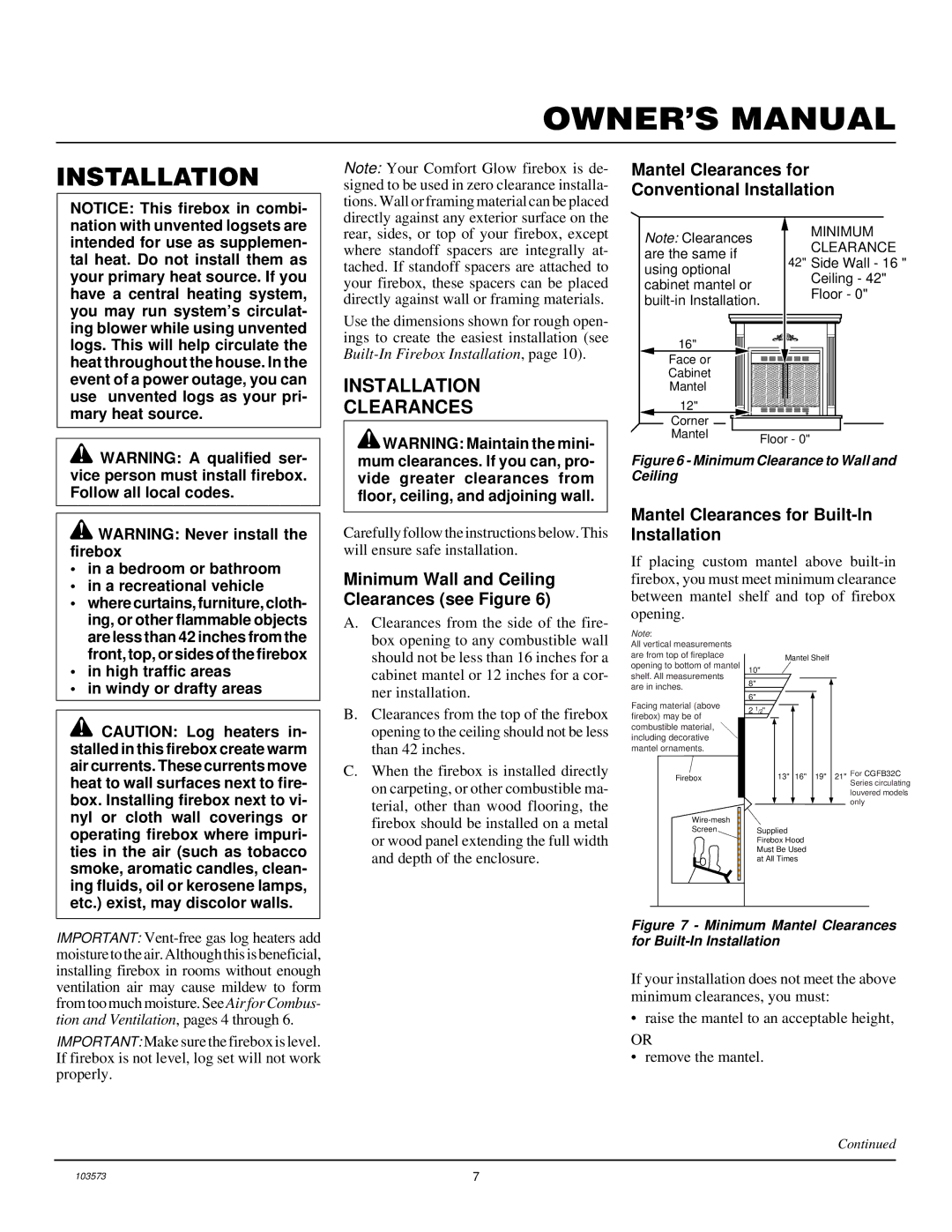
OWNER’S MANUAL
INSTALLATION
NOTICE: This firebox in combi- nation with unvented logsets are intended for use as supplemen- tal heat. Do not install them as your primary heat source. If you have a central heating system, you may run system’s circulat- ing blower while using unvented logs. This will help circulate the heat throughout the house. In the event of a power outage, you can use unvented logs as your pri- mary heat source.
![]() WARNING: A qualified ser- vice person must install firebox. Follow all local codes.
WARNING: A qualified ser- vice person must install firebox. Follow all local codes.
![]() WARNING: Never install the firebox
WARNING: Never install the firebox
• in a bedroom or bathroom | |
• | in a recreational vehicle |
• | where curtains, furniture, cloth- |
| ing, or other flammable objects |
Note: Your Comfort Glow firebox is de- signed to be used in zero clearance installa- tions. Wall or framing material can be placed directly against any exterior surface on the rear, sides, or top of your firebox, except where standoff spacers are integrally at- tached. If standoff spacers are attached to your firebox, these spacers can be placed directly against wall or framing materials.
Use the dimensions shown for rough open- ings to create the easiest installation (see
INSTALLATION
CLEARANCES
![]() WARNING: Maintain the mini- mum clearances. If you can, pro- vide greater clearances from floor, ceiling, and adjoining wall.
WARNING: Maintain the mini- mum clearances. If you can, pro- vide greater clearances from floor, ceiling, and adjoining wall.
Carefully follow the instructions below. This will ensure safe installation.
Minimum Wall and Ceiling Clearances (see Figure 6)
A. Clearances from the side of the fire- |
Mantel Clearances for
Conventional Installation
Note: Clearances |
| MINIMUM | |
| CLEARANCE | ||
are the same if |
| ||
42" | Side Wall - 16 " | ||
using optional | |||
| Ceiling - 42" | ||
cabinet mantel or |
| ||
| Floor - 0" | ||
| |||
|
|
16" |
|
Face or |
|
Cabinet |
|
Mantel |
|
12" |
|
Corner |
|
Mantel | Floor - 0" |
|
Figure 6 - Minimum Clearance to Wall and Ceiling
Mantel Clearances for Built-In Installation
If placing custom mantel above
| are less than 42 inches from the |
| front, top, or sides of the firebox |
• | in high traffic areas |
• | in windy or drafty areas |
![]() CAUTION: Log heaters in- stalled in this firebox create warm air currents. These currents move heat to wall surfaces next to fire- box. Installing firebox next to vi-
CAUTION: Log heaters in- stalled in this firebox create warm air currents. These currents move heat to wall surfaces next to fire- box. Installing firebox next to vi-
box opening to any combustible wall |
should not be less than 16 inches for a |
cabinet mantel or 12 inches for a cor- |
ner installation. |
B. Clearances from the top of the firebox |
opening to the ceiling should not be less |
than 42 inches. |
C. When the firebox is installed directly |
on carpeting, or other combustible ma- |
terial, other than wood flooring, the |
Note:
All vertical measurements are from top of fireplace opening to bottom of mantel shelf. All measurements are in inches.
Facing material (above firebox) may be of combustible material, including decorative mantel ornaments.
Firebox
10"
8"
6"
21/2"
Mantel Shelf
13" 16" 19" 21" For CGFB32C Series circulating
louvered models only
nyl or cloth wall coverings or operating firebox where impuri- ties in the air (such as tobacco smoke, aromatic candles, clean- ing fluids, oil or kerosene lamps, etc.) exist, may discolor walls.
firebox should be installed on a metal |
or wood panel extending the full width |
and depth of the enclosure. |
| |
Screen | Supplied |
| Firebox Hood |
| Must Be Used |
| at All Times |
IMPORTANT:
IMPORTANT: Make sure the firebox is level. If firebox is not level, log set will not work properly.
Figure 7 - Minimum Mantel Clearances for Built-In Installation
If your installation does not meet the above minimum clearances, you must:
• raise the mantel to an acceptable height,
OR
• remove the mantel.
Continued
103573 | 7 |
